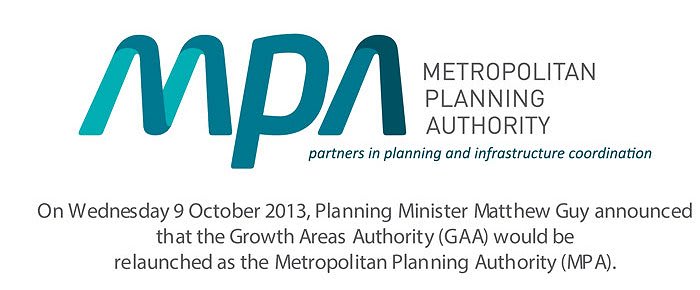Matthew Guy on the MPA, Transport advice and PANS-OPS
As the first in a series of articles revolving around an interview held with State Planning Minister Matthew Guy in the wake of the Plan Melbourne strategy release, today's article centres around the Metropolitan Planning Authority (MPA) which was similarly launched last week; as a successor to the Growth Areas Authority . Whilst still in its infancy, the Metropolitan Planning Authority's website carries the following description:
The MPA has been created to implement the initiatives and vision set out in the Victorian Government’s metropolitan planning strategy, Plan Melbourne. As well as working with its partners in planning, the MPA will implement plans to achieve real outcomes. It will also focus on planning and infrastructure coordination in key strategic areas that are of significance to the state, throughout Melbourne’s inner and outer suburbs as well as regional centres. The MPA is an independent statutory body with a broad, facilitative role to work with local councils, other government agencies and the planning and development industry to help deliver exciting Greenfield and Urban Renewal projects across Victoria.
The MPA will have a wide-ranging city development policy brief to advise Spring Street on, and one area of particular interest is transport. As stated by the Planning Minister in our interview last week, currently there are multiple agencies - the likes of VicRoads and PTV to name a few - which advise Government on infrastructure investment priorities.
Going forward this is set to change with a single body - the MPA - assuming the role of primary provider of advice once analysis drawn from existing agencies is complete.
The Minister's words from Friday:
AT: Will government decisions on how to prioritise large transport infrastructure projects - both in designated urban renewal areas and in areas which councils rezone - be influenced by the Metropolitan Planning Authority?
MG: Very much so, one of the key reasons to establish the MPA is because in the past we've had transport projects that are being funded to areas that are being developed in say 10 years time, but areas that are being developed now having no transport infrastructure projects underway - we need to refocus priorities in this area. Current advice comes from a range of sources: PTV, VicRoads, The Department, Growth Areas authority, Water Authorities - it comes from so many bodies.
It [the MPA] is the first time we've actually said the advice on transport infrastructure priorities will come into one body - the Metropolitan Planning Authority - and the single authority will then provide advice to Government to say for example "it's Government's decision but we (the authority) would recommend Government should look at putting A, B and C project into a given area because population growth is coming through now or in two years time". It's about having one agency give advice to government on how to co-ordinate infrastructure.
AT: So that advice provided by the MPA, will that also include funding options for individual projects as well?
MG: No.
Editor's note: An answer to a separate follow up question - post interview - on which authority or mechanism will explore funding options for projects which the MPA advises the Government to proceed on received after original publish time, the answer provided by a spokesperson for the Planning Minister is provided:
The Treasury department will remain responsible for determining funding options for transport projects, including public transport, road and cycling projects. However the MPA will be able to propose options. For instance, the Growth Areas Authority (now MPA) already does long-term planning and projections of DCP and GAIC revenues in growth areas, and how they can fund a planned roll out of infrastructure.
On the topic of PANS-OPS and its impact on tall buildings in Central Melbourne, the Planning Minister made it quite clear he intends to work with the new Federal Government to rectify aviation-related issues which recently dogged the Australia 108 proposal. It is the Minister's strong view development in Central Melbourne should not be constrained by aviation regulations.
The Minister stated (on the topic of Australia 108) "The PANS-OPS issue hasn't gone away, I have been up before the Federal election and will go again to talk with Warren Truss because in our view the CBD and Southbank should be treated like a geographic constraint" The Minister went on to clarify the issues for height in Central Melbourne only relate to the potential scenario of "a twin engine aircraft taking off in distress from Essendon airport's East-West runway - Melbourne airport was never an issue".
On Friday Laurence Dragomir will be back with our next installment on our conversation with the Planning Minister.
